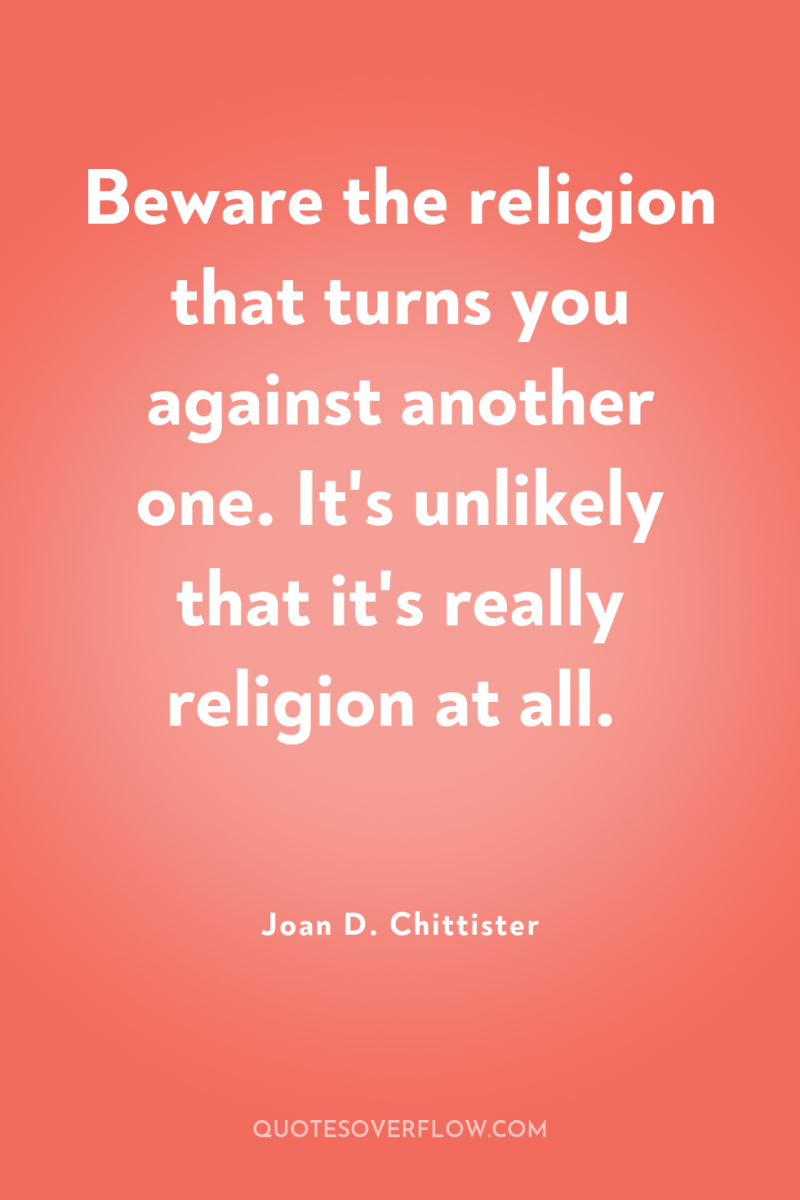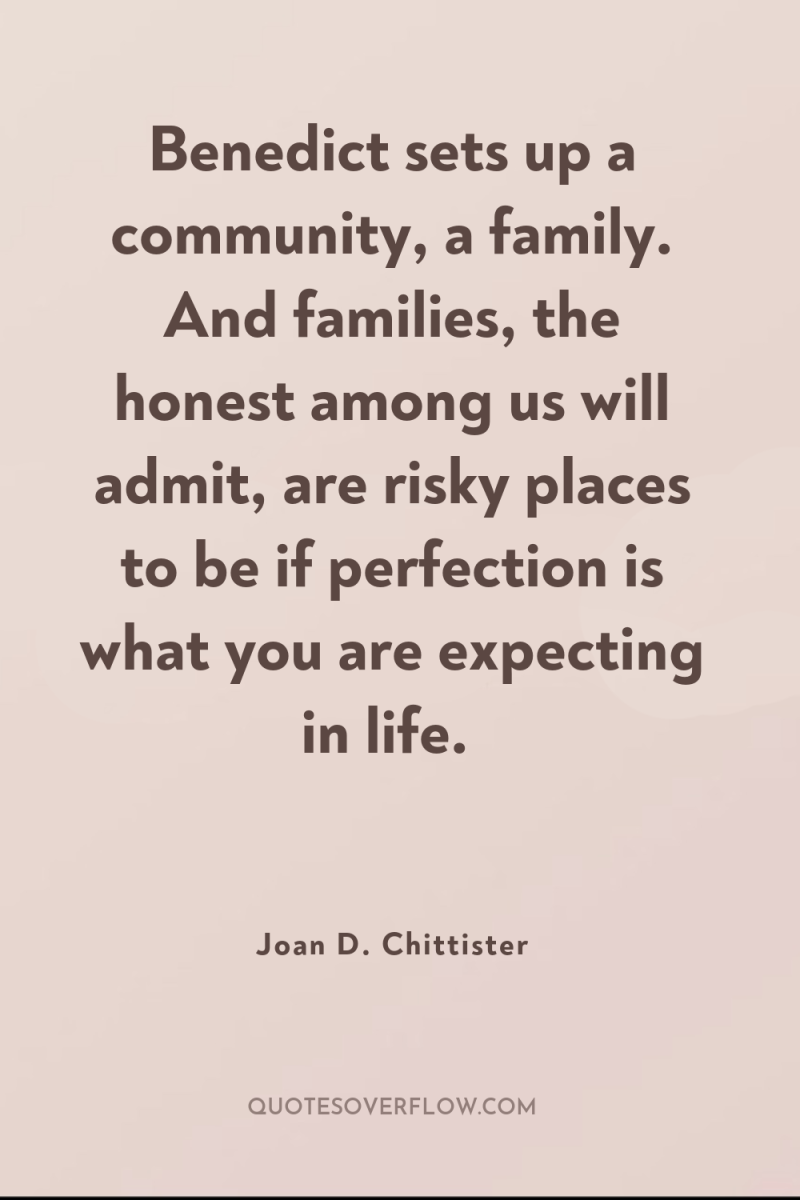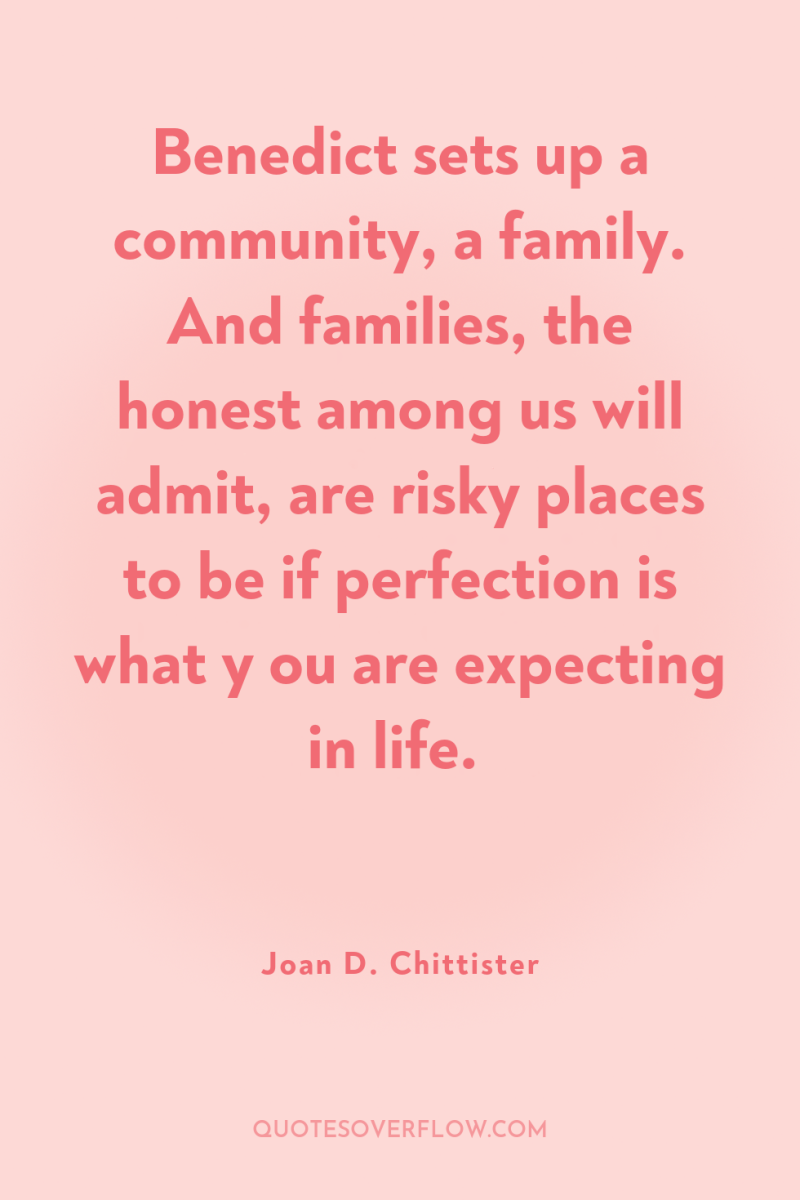
Beware the religion that turns you against another one. It's unlikely that it's really religion at all.Joan D. Chittister
Spirituality without a prayer life is no spirituality at all, and it will not last beyond the first defeats. Prayer is an opening of the self so that the Word of God can break in and make us new. Prayer unmasks. Prayer converts. Prayer impels. Prayer sustains us on the way. Pray for the grace it will take to continue what you would like to quit.Joan D. Chittister
It is one thing to speak kindly to an irritating stranger on Monday. It is quite another thing to go on speaking kindly to the same irritating relative, or irritating employee, or irritating child day after day, week after week, year after year and come to see in that what God is asking of me, what God is teaching me about myself in this weary, weary moment.Joan D. Chittister
Silence is a frightening thing. Silences leaves us at the mercy of the noise within us. We hear the fears that need to be faced. We hear, then, the angers that need to be cooled. We hear the emptiness that needs to be filled. We hear the cries for humility and reconciliation and centeredness. We hear ambition and arrogance and attitudes of uncaring awash in the shallows of the soul. Silence demands answers. Silence invites us to depth. Silence heals what hoarding and running will not touch. .Joan D. Chittister
Humble people walk comfortably in every group. No one is either too beneath them or too above them for their own sense of well-being. They are who they are, people with as much to give as to get, and they know it. And because they're at ease with themselves, they can afford to be open with others.. Having discovered who we are and having opened ourselves to life and having learned to be comfortable with it, we know that God is working in us. We know, most of all, that whatever happens we have nothing to fear.. we are free of the false hopes and false faces and false needs that once held us down. We can fly now. Let all the others scratch and grapple for the plastic copy of life. We have found the real thing. .Joan D. Chittister
War within ourselves is always a prelude to war outside ourselves. All war starts within our own hearts. When our egos are inflated or our desires insatiable, we go to war with the other for the sad joy of maintaining our one-dimensional worlds.Joan D. Chittister

Benedict sets up a community, a family. And families, the honest among us will admit, are risky places to be if perfection is what you are expecting in life.Joan D. Chittister
Friendship is the call out of isolation and selfishness in order to teach me how to love and how to serve. But without stability, friendship - real soul-searing friendship, the kind that makes us choose between domination and infatuation and possessiveness and dependence for growth and freedom and depth and responsibility and self-knowledge - is impossible. Stability is what enables us, in other words, to live totally in God and totally for others.Joan D. Chittister
To pray in the midst of the mundane is simply and strongly to assert that this dull and tiring day is holy and its simple labors are the stuff of God's saving presence for me now. To pray simply because it is prayer time is no small act of immersion in the God who is willing to wait for us to be conscious, to be ready, to be willing to become new in life. Prayer, Benedictine spirituality demonstrates, is not a matter of mood. To pray only when we feel like it is more to seek consolation than to risk conversion. To pray only when it suits us is to want God on our terms. To pray only when it is convenient is to make the God-life a very low priority in a list of better opportunities. To pray only when it feels good is to court total emptiness when we most need to be filled. The hard fact is that nobody finds time for prayer. The time must be taken. There will always be something more pressing to do, something more important to be about than the apparently fruitless, empty act of prayer. But when that attitude takes over, we have begun the last trip down a very short road because, without prayer, the energy for the rest of life runs down. The fuel runs out. We become our own worst enemies: we call ourselves too tired and too busy to pray when, in reality, we are too tired and too busy not to pray. Eventually, the burdens of the day wear us down and we no longer remember why we decided to do what we're doing: work for this project, marry this woman, have these children, minister in this place. And if I cannot remember why I decided to do this, I cannot figure out how I can go on with it. I am tired and the vision just gets dimmer and dimmer. .Joan D. Chittister
One of the functions of leadership is to lead, and weak managers may simply check and check and check with others because they are not capable of leading when it is required of them to lead. Benedict says that in matters of importance the abbot or prioress is to ask everyone in the community, 'starting with the youngest, ' and then the abbot or prioress is to 'do what seems best.Joan D. Chittister

Benedict sets up a community, a family. And families, the honest among us will admit, are risky places to be if perfection is what y ou are expecting in life.Joan D. Chittister
Darkness deserves gratitude. It is the alleluia point at which we learn to understand that all growth does not take place in the sunlight.Joan D. Chittister
Like a great waterwheel, the liturgical year goes on relentlessly irrigating our souls, softening the ground of our hearts, nourishing the soil of our lives until the seed of the Word of God itself begins to grow in us, comes to fruit in us, ripens in us the spiritual journey of a lifetime. So goes the liturgical year through all the days of our lives. /it concentrates us on the two great poles of the faith - the birth and death of Jesus of Nazareth. But as Christmas and Easter trace the life of Jesus for us from beginning to end, the liturgical year does even more: it also challenges our own life and vision and sense of meaning. Both a guide to greater spiritual maturity and a path to a deepened spiritual life, the liturgical year leads us through all the great questions of faith as it goes. It rehearses the dimensions of life over and over for us all the years of our days. It leads us back again and again to reflect on the great moments of the life of Jesus and so to apply them to our own .. As the liturgical year goes on every day of our lives, every season of every year, tracing the steps of Jesus from Bethlehem to Jerusalem, so does our own life move back and forth between our own beginnings and endings, between our own struggles and triumphs, between the rush of acclamation and the crush of abandonment. It is the link between Jesus and me, between this life and the next, between me and the world around me, that is the gift of the liturgical year. The meaning and message of the liturgical year is the bedrock on which we strike our own life's direction. Rooted in the Resurrection promise of the liturgical year, whatever the weight of our own pressures, we maintain the course. We trust in the future we cannot see and do only know because we have celebrated the death and resurrection of Jesus year after year. In His life we rest our own. ― Joan D. Chittister, The Liturgical Year: The Spiraling Adventure of the Spiritual Life - The Ancient Practices Series .Joan D. Chittister
Everywhere I looked, hope existed - but only as some kind of green shoot in the midst of struggle. It was a theological concept, not a spiritual practice. Hope, I began to realize, was not a state of life. It was at best a gift of life.Joan D. Chittister
The spiritual response is too often a simplistic one: we abandon God or we blame God for abandoning us.Joan D. Chittister
We fail to move beyond what is safe, we abandon our dreams in favor of what is sure rather than strive for what is best for us.Joan D. Chittister